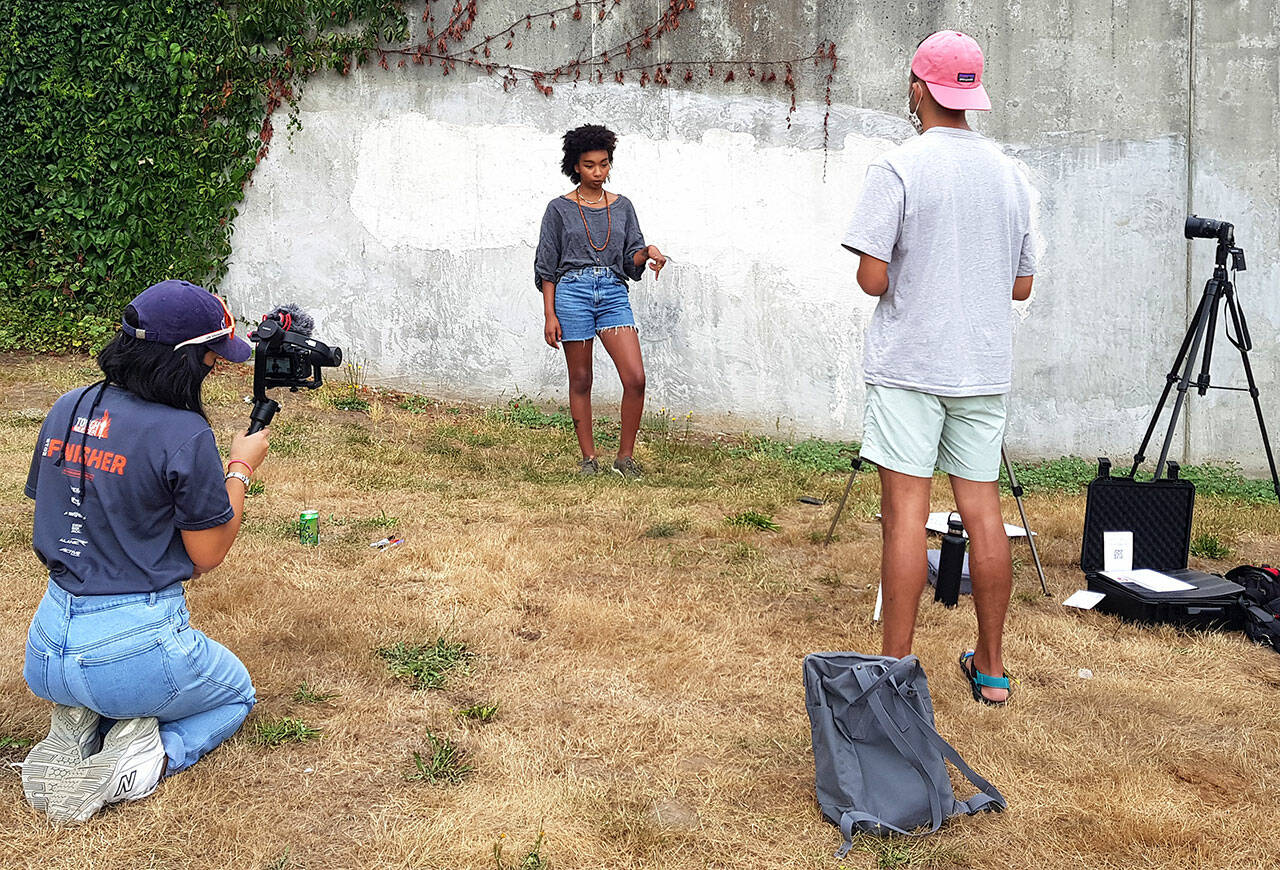SNOHOMISH — Over 700 people tuned in for the debut of the documentary “What Happened on First Street” Saturday night.
In spring 2020, a group of locals — many armed, some adorned with Confederate flags — “hijacked the narrative” of what was supposed to be a night of protest against racism in Snohomish, said City Councilmember Judith Kuleta in a 2020 meeting.
The roughly one-hour movie dissects those events and examines racism in Snohomish through the eyes of people of color living in the community, with a focus on educators and youth. It also shares their ideas for a path forward.
The film debuted the same day the incumbent mayor, John Kartak, hosted a campaign rally attended by a few dozen people at an indoor soccer field north of downtown. Speakers said Snohomish is inclusive, and that they had not seen the kind of racism described at recent city council meetings. The mayor railed against politics of more liberal Seattle as a “virus.”
The virtual screening opened with a welcome from filmmakers Drake Wilson and Carolyn Yip, both recent college graduates who attended Snohomish schools. The project came from a place of care for their community, Wilson said.
“It feels kind of like healing,” Wilson said after the screening. “Like, the start of a healing process.”
During the film, Snohomish School District students and teachers of color opened up about countless days when microaggressions and slurs were hurled their way.
“When I was in third grade, that was the first time I was called the n-word by a white man,” said Payton Odom, a Snohomish High School senior, in the film. “When I was in seventh grade, the students at my school developed a nickname for me: ghetto girl. When I was in ninth grade I didn’t want to go to school events anymore — I got sick of being called the n-word.”
It takes courage to share these stories, said Tabitha Baty, president of Snohomish for Equity, a sponsor of the screening prior to the film’s debut.
Mahllie Beck said after the trailer for the documentary started gaining traction on social media, people began recognizing her as one of the film’s main voices. She said those interactions were a good segue to encourage people to watch.
Sharing her story and reflecting on the 2020 events for the film was not easy.
“When I was being interviewed I was still very stressed out about everything,” said Beck after the screening. “And I can kind of see it on my face like I was still kind of processing everything,” but hearing other people of color in the community share similar experiences is “really grounding.”
Teachers of color who shared their stories in the film are adored by current students and Snohomish high school graduates, Beck said, and the inclusion of their stories was “really special.”
“One of the students asked, where’s Mrs. Purviance? And one of the students said, ‘Oh, she’s probably at Kentucky Fried Chicken getting chicken,’” said Kathy Purviance-Snow, a Snohomish High School teacher, during the film. “I was speechless. I just didn’t know what to say. And those instances, bring me up short each and every time.”
The racism displayed in each of these incidents culminated in the presence of hateful language and symbols on First Street in 2020, interviewees said.
In the months following, a group of Snohomish youth known as Gen J led conversations about race and equity in the community and called on the school district to commit to making change.
Today, the district has an equity statement on their welcome page, which outlines steps they are taking to address systemic racism.
“When the school district made some changes, I think that was like a really proud moment,” Beck said after the screening. “I felt like we actually made a difference quite quickly.”
The documentary ends with messages of hope.
“The power of the people is greater than the people in power,” said Rep. John Lovick, in the film. “Standing up and speaking out, that’s what is going to make a difference … You stand for what you tolerate.”
People of color interviewed in the documentary called on Snohomish leaders and residents to condemn biased or hateful speech, engage in hard conversations with their family and friends and be open to listening and learning.
Ultimately, co-filmmakers Yip and Wilson said they hope the documentary can trigger forward momentum.
“It started with the youth,” Wilson said. “It started with our experiences growing up… I just hope that (students today) can have better experiences, and the kids they go to school with are more aware.”
Snohomish For Equity plans to post the documentary. More information is available on their website and social media.
Isabella Breda: 425-339-3192; isabella.breda@heraldnet.com. Twitter: @BredaIsabella.
Talk to us
> Give us your news tips.
> Send us a letter to the editor.
> More Herald contact information.

























